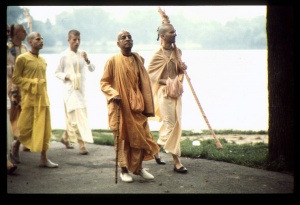CC Madhya 20.270: Difference between revisions
m (1 revision(s)) |
No edit summary |
||
| Line 1: | Line 1: | ||
{{ | [[Category:Sri Caitanya-caritamrta - Madhya-lila Chapter 20|C270]] | ||
<div style="float:left">'''[[Sri Caitanya-caritamrta|Śrī Caitanya-caritāmṛta]] - [[CC Madhya|Madhya-līlā]] - [[CC Madhya 20|Chapter 20: Lord Śrī Caitanya Mahāprabhu Instructs Sanātana Gosvāmī in the Science of the Absolute Truth]]'''</div> | |||
<div style="float:right">[[File:Go-previous.png|link=CC Madhya 20.269|Madhya-līlā 20.269]] '''[[CC Madhya 20.269|Madhya-līlā 20.269]] - [[CC Madhya 20.271|Madhya-līlā 20.271]]''' [[File:Go-next.png|link=CC Madhya 20.271|Madhya-līlā 20.271]]</div> | |||
{{CompareVersions|CC|Madhya 20.270|CC 1975|CC 1996}} | |||
{{RandomImage}} | |||
==== TEXT 270 ==== | ==== TEXT 270 ==== | ||
<div | <div class="verse"> | ||
pravartate yatra rajas tamas tayoḥ | :pravartate yatra rajas tamas tayoḥ | ||
sattvaṁ ca miśraṁ na ca kāla-vikramaḥ | :sattvaṁ ca miśraṁ na ca kāla-vikramaḥ | ||
na yatra māyā kim utāpare harer | :na yatra māyā kim utāpare harer | ||
anuvratā yatra surāsurārcitāḥ | :anuvratā yatra surāsurārcitāḥ | ||
</div> | </div> | ||
| Line 14: | Line 18: | ||
==== SYNONYMS ==== | ==== SYNONYMS ==== | ||
<div | <div class="synonyms"> | ||
''pravartate''—exists; ''yatra''—where; ''rajaḥ''—the mode of passion; ''tamaḥ''—the mode of ignorance; ''tayoḥ''—of both of them; ''sattvam ca''—and the mode of goodness; ''miśram''—mixture; ''na''—not; ''ca''—also; ''kāla-vikramaḥ''—the influence of time or annihilation; ''na''—not; ''yatra''—where; ''māyā''—external energy; ''kim''—what; ''uta''—to speak; ''apare''—others; ''hareḥ''—of the Supreme Personality of Godhead; ''anuvratāḥ''—strict followers; ''yatra''—where; ''sura''—by demigods; ''asura''—and by demons; ''arcitāḥ''—being worshiped. | |||
</div> | </div> | ||
| Line 21: | Line 25: | ||
==== TRANSLATION ==== | ==== TRANSLATION ==== | ||
<div | <div class="translation"> | ||
“‘In the spiritual world, there is neither the mode of passion, the mode of ignorance nor a mixture of both, nor is there adulterated goodness, the influence of time or māyā herself. Only the pure devotees of the Lord, who are worshiped both by demigods and by demons, reside in the spiritual world as the Lord’s associates.’ | “‘In the spiritual world, there is neither the mode of passion, the mode of ignorance nor a mixture of both, nor is there adulterated goodness, the influence of time or māyā herself. Only the pure devotees of the Lord, who are worshiped both by demigods and by demons, reside in the spiritual world as the Lord’s associates.’ | ||
</div> | </div> | ||
| Line 28: | Line 32: | ||
==== PURPORT ==== | ==== PURPORT ==== | ||
<div | <div class="purport"> | ||
This verse from Śrīmad-Bhāgavatam ([[SB 2.9.10]]) was spoken by Śrīla Śukadeva Gosvāmī. He was answering the questions of Parīkṣit Mahārāja, who asked how the living entity falls down into the material world. Śukadeva Gosvāmī explained the cream of Śrīmad-Bhāgavatam in four verses, which had been explained to Lord Brahmā at the end of the severe austerities he performed for one thousand celestial years. At that time, Brahmā was shown the spiritual world and its transcendental nature. | This verse from [[Srimad-Bhagavatam|''Śrīmad-Bhāgavatam'']] ([[SB 2.9.10]]) was spoken by Śrīla Śukadeva Gosvāmī. He was answering the questions of Parīkṣit Mahārāja, who asked how the living entity falls down into the material world. Śukadeva Gosvāmī explained the cream of [[Srimad-Bhagavatam|''Śrīmad-Bhāgavatam'']] in four verses, which had been explained to Lord Brahmā at the end of the severe austerities he performed for one thousand celestial years. At that time, Brahmā was shown the spiritual world and its transcendental nature. | ||
</div> | </div> | ||
__NOTOC__ | |||
<div style="float:right; clear:both;">[[File:Go-previous.png|link=CC Madhya 20.269|Madhya-līlā 20.269]] '''[[CC Madhya 20.269|Madhya-līlā 20.269]] - [[CC Madhya 20.271|Madhya-līlā 20.271]]''' [[File:Go-next.png|link=CC Madhya 20.271|Madhya-līlā 20.271]]</div> | |||
__NOTOC__ | |||
__NOEDITSECTION__ | |||
Revision as of 10:45, 7 September 2021

A.C. Bhaktivedanta Swami Prabhupada
TEXT 270
- pravartate yatra rajas tamas tayoḥ
- sattvaṁ ca miśraṁ na ca kāla-vikramaḥ
- na yatra māyā kim utāpare harer
- anuvratā yatra surāsurārcitāḥ
SYNONYMS
pravartate—exists; yatra—where; rajaḥ—the mode of passion; tamaḥ—the mode of ignorance; tayoḥ—of both of them; sattvam ca—and the mode of goodness; miśram—mixture; na—not; ca—also; kāla-vikramaḥ—the influence of time or annihilation; na—not; yatra—where; māyā—external energy; kim—what; uta—to speak; apare—others; hareḥ—of the Supreme Personality of Godhead; anuvratāḥ—strict followers; yatra—where; sura—by demigods; asura—and by demons; arcitāḥ—being worshiped.
TRANSLATION
“‘In the spiritual world, there is neither the mode of passion, the mode of ignorance nor a mixture of both, nor is there adulterated goodness, the influence of time or māyā herself. Only the pure devotees of the Lord, who are worshiped both by demigods and by demons, reside in the spiritual world as the Lord’s associates.’
PURPORT
This verse from Śrīmad-Bhāgavatam (SB 2.9.10) was spoken by Śrīla Śukadeva Gosvāmī. He was answering the questions of Parīkṣit Mahārāja, who asked how the living entity falls down into the material world. Śukadeva Gosvāmī explained the cream of Śrīmad-Bhāgavatam in four verses, which had been explained to Lord Brahmā at the end of the severe austerities he performed for one thousand celestial years. At that time, Brahmā was shown the spiritual world and its transcendental nature.